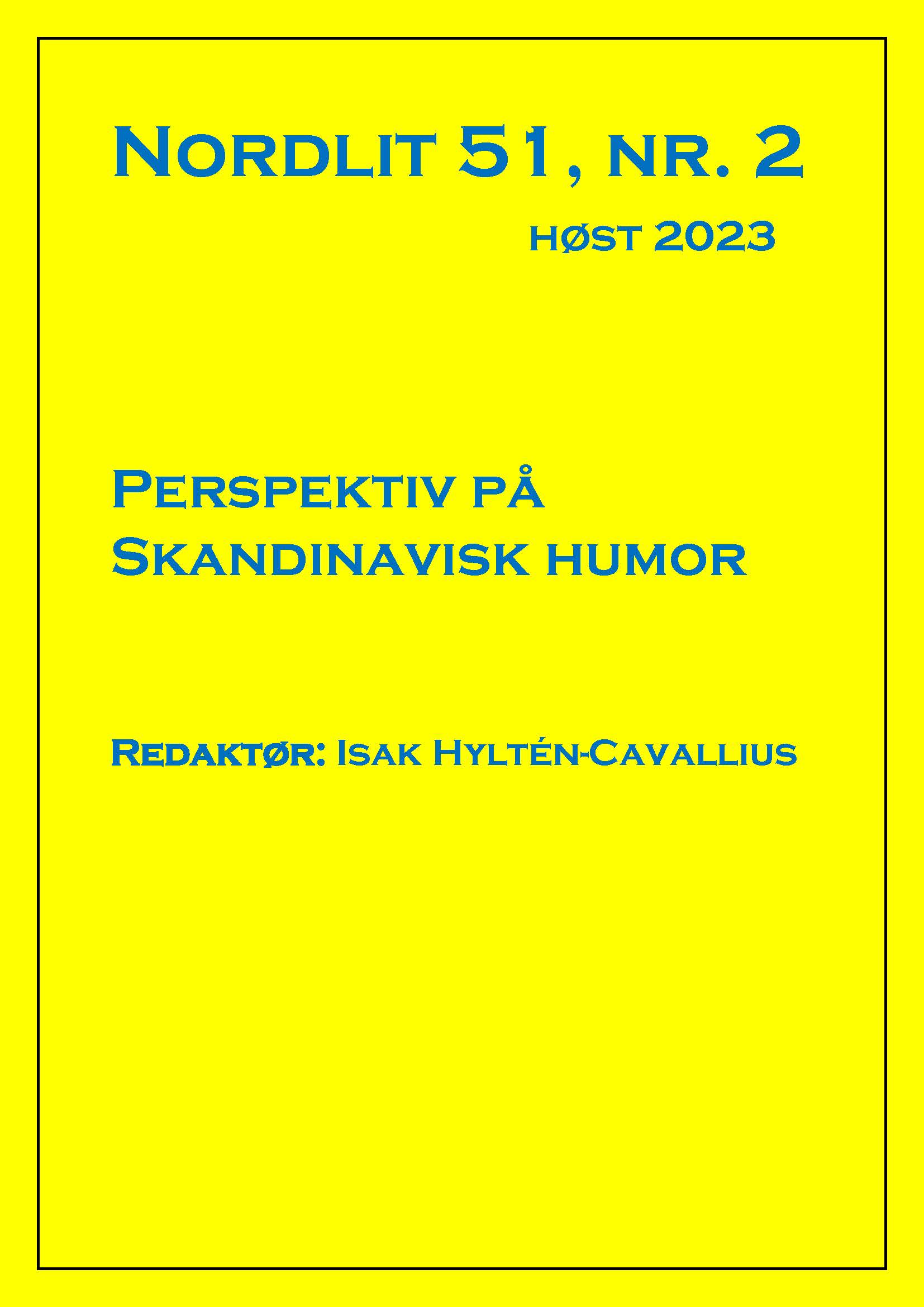Nordic Humour
A Question of Humour Socialisation?
DOI:
https://doi.org/10.7557/13.6975Keywords:
spontaneous conversational humour, national humour, Big Humour, humour socializationAbstract
Starting from my former empirical studies but supplemented with fresh fictional “data” from Lars von Trier’s latest TV series Riget Exodus (2022), I first describe how Danes use humour in very characteristic ways, also in cross-cultural professional settings. Next, I explain not only Danish humour but all national humour with the notion of humour socialisation, which integrates and combines national humour with the national language on the one hand, and the specific national process of civilisation on the other hand. Moving to Nordic humour, I focus on how Danes and Swedes perceive each other’s humour, and then explain divergences between the humour of these two Nordic countries. These differences, I conclude, are the result mainly of differences in their respective civilising processes, while I am waiting and hoping for deeper comparative linguistic studies of the use of ‘humour warning signals in Danish and Swedish.
References
Clark, Herbert and Richard Gerrig. 1984. "On the pretense theory of irony". Journal of Experimental Psychology: General, 113(1). https://doi.org/10.1037/0096-3445.113.1.121
Curry, Oliver and Robin Dunbar. 2013. "Sharing a joke: The effects of a similar sense of humor on affiliation and altruism". Evolution and Human Behavior, 34(2). https://doi.org/10.1016/j.evolhumbehav.2012.11.003
Elias, Norbert. 1994. The Civilizing Process. History of Manners. State Formation and Civilization. Oxford: Basil Blackwell.
Elias, Norbert and Stephen Mennell. 2006. The Court Society. Revised edition. Dublin: University College Dublin Press.
Flamson, Thomas and H. Clark Barrett. 2008. "The encryption theory of humor: A knowledge-based mechanism of honest signaling". Journal of Evolutionary Psychology, 6(4). https://doi.org/10.1556/JEP.6.2008.4.2
Flamson, Thomas and H. Clark Barrett. 2013. "Signals of humor. Encryption and laughter in social interaction". In Developments in Linguistic Humor Theory, edited by Martha Dynal, 49-73. Amsterdam: John Benjamins. https://doi.org/10.1075/thr.1.04fla
Grice, Paul. 1989. Studies in the Way of Words. Cambridge: Harvard University Press.
Hansen, Erik and Lars Heltoft. 2011. Grammatik over det Danske Sprog I-III. Odense: Syddansk Universitetsforlag.
Høffding, Harald. 1916. Den store Humor. En psykologisk studie. København: Nordisk Forlag.
Jespersen, Knud J.V. 2004. A History of Denmark. New York: Palgrave.
Kaspersen, Lars Bo. 2008. Danmark i verden. København: Hans Reitzels Forlag.
Kaspersen, Lars Bo. 2020. "The Creation of Modern Denmark - A Figurational Analysis". Historical Social Research, 45(1). https://doi.org/10.12759/hsr.45.2020.1.182-206
Latour, Bruno. 2005. Reassembling the Social. An Introduction to Actor Network Theory. Oxford: Oxford University Press. https://doi.org/10.1093/oso/9780199256044.001.0001
Levisen, Carsten. 2012. Cultural Semantics and Social Cognition. Berlin: de Gruyter Mouton. https://doi.org/10.1515/9783110294651
Lundquist, Lita. 2010. "Humour in intercultural professional settings: A shortcut to language, cognition and identity". In Language, Cognition and Identity, edited by Emanuela Cresti and Iørn Korzen, 176-191. Firenze: Firenze University Press.
Lundquist, Lita. 2013. "L'humour danois confronté aux autres". In Frontières de l'humour, edited by Maria D.V. García, 191-207. Paris: L'Harmattan.
Lundquist, Lita. 2014. "Danish humor in cross-cultural professional settings: linguistic and social aspects". Humor: International Journal of Humor Research, 27(1): 141-163. https://doi.org/10.1515/humor-2013-0044
Lundquist, Lita. 2020. Humorsocialisering. Hvorfor er danskerne (ikke) så sjove (som de selv tror)? København: Samfundslitteratur.
Lundquist, Lita. 2021. "Humour socialisation. Why the Danes are not as funny as they think they are". Globe, vol. 12. https://doi.org/10.5278/ojs.globe.v12i.6497
Lundquist, Lita and Helen Dyrbye. 2023. Danish Humour - Sink or Swim. Hellerup: BoD.
Lundquist, Lita and Magali Gravier. 2019. "You have got to be joking. A study of humour in the political context of the European Parliament". In Humor, Education and Art: a transdisciplinary approach, edited by Jacqueline Benavides Delgado, 71-88. Bogota: Ediciones Universidad Cooperativa de Colombia.
Mellon, Sir James. 1992. Og gamle Danmark. En beskrivelse af Danmark i det herrens år 1992. Viby J.: Centrum.
Sperber, D. and Deirdre Wilson. 1981. "Irony and the use-mention distinction". In Radical Pragmatics, edited by Peter Cole, 295-318. New York/London: Academic Press.
Ziv, Avner. 1988. National Styles of Humor. New York: Greenwood Press.
Østergaard, Uffe. 2006. "Denmark: A big small state". In National Identity and the Varieties of Capitalism. The Danish Experience, edited by John L. Campbell, John A. Hall and Ove K. Pedersen, 51-98. Québec: McGill-Queen's University Press. https://doi.org/10.1515/9780773573253-004
Downloads
Published
How to Cite
Issue
Section
License
Copyright (c) 2023 Lita Lundquist

This work is licensed under a Creative Commons Attribution 4.0 International License.









